- Home
- Ian McDonald
Be My Enemy Page 3
Be My Enemy Read online
Page 3
That, Everett M thought, gave older people big problems: making a “What Were You Doing When?” moment out of something that had been kept secret for twenty years. August 27, 1963: What were you doing? Anything to mark that date as different or extraordinary? Was it your birthday, a first date, a bank holiday? Was it the last good day of a great summer before you had to go back to school? Or was the day the aliens came just a day like any other? You went to school, to work, to the shops while at the back of the Moon the Thryn ship came out of sleep after thirty thousand years of travel and turned its senses on the blue world beneath it.
The size of a coffee can: that was what everyone knew about the Thryn probe. The size and shape of a coffee can. Coffee hadn't come in cans for years; now more people knew what a Thryn star-seed looked like than a coffee can. It was kind of small for a spaceship carrying aliens, but it was as big as it needed to be: the spaceship was the alien. Long before the probe had started its journey, the Thryn had passed from biological intelligence to a machine intelligence. The star from which the probe came—Epsilon Eridani—was not even the Thryn home world. They no longer had a home world. The probes were seeds, blown between the stars like dandelion down. Each contained all that was necessary to build a new Thryn Sentiency. Some fell on fertile worlds and sprouted and took root and grew a civilization. Some fell forever between the stars and never felt the tug of a sun's gravity to wake them up. Seeds were cheap and plentiful. But the seed waking up in the Earth/Moon system and searching for raw materials to convert into another Thryn Sentiency discovered a thing no Thryn seed-ship ever had before. It reached out with its intelligence and touched another intelligence. An intelligence that was not Thryn. This was something other, an alien intelligence.
The world of 1963 was a world on armed watch, of rival superpowers with daggers half drawn from sheaths. The United States and the Soviet Union eyed each other with spy planes and satellites and early warning radars, each wired to a hair trigger that could launch enough nuclear warheads to smelt the surface of the planet to glowing glass. The Thryn probe's sensor sweep triggered alarms in both American and Russian early warning radars. It looked to each like the other was launching a strike. Panic cascaded upward. In the White House and the Kremlin fingers hovered over “launch” buttons. The world came within a breath of nuclear war. Then both the US and the USSR learned, like the Thryn, that this was something other.
Out at the Moon, the Thryn Sentiency saw what it had triggered, and hesitated. The Thryn Sentiency pondered. The Thryn Sentiency deliberated. The Thryn Sentiency thought deep and hard and long—long for a machine intelligence. In human terms, it was something in the region of three minutes. The Thryn Sentiency spoke.
The world of 1963 was nervous, paranoid, bad tempered—adolescent. It would have broken at the revelation that alien intelligence had arrived. The USSR, the USA, and the other permanent members of the UN Security Council made a deal with the Thryn Sentiency. Six years later, when Neil Armstrong and Buzz Aldrin stepped onto the surface of the Moon, what the camera did not show was the figure waiting there to meet them, the figure of a little lady with kind eyes and grey skin. She wore no heavy space suit, her skin was bare to vacuum. Madam Moon, a construct of the Thryn Sentiency. She watched them plant the stars and stripes and salute it, but the Moon was not theirs. In the six years since the agreement, the Thryn coffee can had unfolded into replicators and fabricators and constructors and had dug deep into the dark side of the Moon, sending tendrils of Thryn technology down through the rock like a fungus. Solar collectors opened like mushrooms on an autumn morning all across the South Pole-Aitken Basin. By 1983, the agreed date for the conspiracy to end, the Thryn Sentiency had converted the entire far half of the moon into a terrifying warren of spires and pits and webs and fans that looked a little bit like a science fiction movie city and a little bit like a dead, white coral reef, but most of all like nothing anyone had ever seen or even imagined before. All the way down to the Moon's cold, dead core.
Laura and Tejendra had not been born when the Thryn star-seed arrived. In 1983 Laura had been in Year 9 at Rectory Road Comprehensive, writing Duran Duran and Spandau Ballet on her pencil case in felt marker. Tejendra had been choosing his A-Levels for Oxford while his mum and dad begged him to go to Imperial because it meant he wouldn't have to live away from home. August 27, 1983, twenty years to the minute after the Thryn seed-ship sensors almost touched off a nuclear war, that was the “What Were You Doing When?” moment. The great deception was exposed. There were protests and riots and outcries, but they died down, as they always do, and people realized that the alien was on the dark side of the Moon and quickly forgot about it. Out of sight was out of mind. And the occasional piece of Thryn tech that made it down and onto the streets made up for looking up at a huge harvest moon and never quite seeing it the same way. History stopped. There were no more “What Were You Doing When?” moments.
No, Everett M thought. There are no more big moments like that, when everyone shares history. But there are small ones, private ones. What were you doing when your dad was killed in a stupid, needless traffic accident?
“It's always been like this for me, sir,” Everett M said.
“You don't need to call me sir,” the prime minister said. He paused. He seemed to chew over the words he was about to speak, as if they had an unpleasant taste. “Is there any pain at all?”
“I just feel cold all the time.”
“They—Madam Moon—has done an extraordinary job.”
“She told me I should be dead. She rebuilt almost every part of me.” Everett M turned his face up into the Earthshine. There was no warmth in it. “Mr. Portillo, why couldn't they save my dad?”
“I know what happened, Everett. I don't know why Madam Moon couldn't save him. The Thryn Sentiency can work wonders, but it can't work miracles. It can't bring back the dead.” Again, he chewed bitter words. “Everett, the man who came with me is very powerful. You know what a Plenipotentiary is?”
“It's an ambassador of our entire planet to the Plenitude of Known Worlds.”
“That's right. He's much more powerful than I am—but don't let him think that. He'll be talking to you soon. He will ask you to do a thing for him. It's a big thing, but only you can do it. Everett, I need you to do what he asks. Everyone needs you. It will sound strange, but he wouldn't ask you if there was any other way. And I want to tell you, Everett, that I, and the whole government, we will support you. We will look after your mum and your sister, your dad's family—don't worry about any of those. Mr. Villiers is going to ask you to be a hero. Not just for the country, not even for the whole world, but for all the Known Worlds. Can you do it, Everett? Will you do it? For all of us?”
Everett M felt a touch of air on the back of his neck. He turned his head to see that the door back to the gate room was open. Madam Moon and Charles Villiers stood side by side, waiting for him. Prime Minister Portillo lightly touched Everett M on the shoulder as he let him go first through the door.
“Good man,” he whispered. “I know you can do it.”
“There is not one world,” Charles Villiers said.
“There are many worlds. Yeah, I know,” Everett M said. They stood on a balcony overlooking the great pit that Everett M had seen through the window of the room when he first woke up on the Moon. Madam Moon had opened another of her jump doors and walked through with them onto this high ledge.
Charles Villiers's face was soft, his skin soft, his voice soft, and Everett did not believe any of it. “I am Plenipotentiary from our world to the recently contacted plane E10. Have you heard about it, seen anything online?” he said.
“My dad worked in multiverse research.”
“Of course. Forgive me, Everett. Then you'll know that it is very similar to our plane, with the major exception of the Thryn Sentiency.”
“I heard that.” He looked over at Madam Moon, standing by the wall where she had opened the jump door. Always smiling, hands folded just so.
Was it the same little old lady who had met Armstrong and Aldrin on the Moon forty-two years before, the frail little old lady who could stand the hard vacuum and a sleet of harder radiation? Was it even the same little old lady who had come to him when he woke in a panic as his body opened up and expanded? Were there many Madam Moons? Did the Thryn Sentiency create and annihilate its manifestations as it required?
“They're talented,” Charles Villiers continued. “They developed Heisenberg Gate technology without Thryn assistance. We might possibly have done that ourselves, but they've gone one step further. They've done what no one else in the Plenitude has done. They have a working map of the Panoply. You know what the Panoply is?”
“All the worlds, not just the ones we know about.” Everett M's dad had been working on exactly that project in this world. Working was not a strong enough word. There must be a word for work that is incredibly hard and at the same time filled with joy, work that tests the best of you and strains you to your limits but so fills your mind that everything else seems pointless by comparison. Work that drives you without pity, but that you love with all your heart. Work that you can't do, no one can do, but that you absolutely must do. That was the kind of work Tejendra had been doing all last summer. His adventures on the Middle-Aged Man bike had been part of the same rush of energy. At the end of the summer term, in the quiet after the students went, he had made a breakthrough. Not a solution, but a way to a solution. Thinking about how to think about the problem. Then, the random meeting with a Sainsbury truck turning left at a traffic signal.
Something Charles Villiers said snapped Everett M out of his memories of that last summer, when his dad had been alive, totally alive, head full of mathematics. “You said, working map?”
Charles Villiers smiled. It was the softest of all the soft things about this elegant, well-dressed, and thoroughly groomed man, and it sent ice deep into Everett M's heart.
“There are many worlds,” Everett M said. Charles Villiers hadn't completed the phrase. “There is not one you…”
“There are many yous,” Charles Villiers finished. “Everett, this must be hard to hear, but in E10, your father completed his work. He has a fully operational map of the Panoply. With it, and a Heisenberg Gate, he can jump to any point in any world—even within a world, like the jump that took Mr. Portillo and me from London to here.”
“You're talking about many Tejendra Singhs,” Everett M said. “You're not talking about many Everett M. Singhs.”
Charles Villiers sat back, startled by the anger in Everett M's voice.
“There is a danger that the map—the Infundibulum—may fall into the wrong hands.”
Everett M shivered as cold air spiralled up from the depths of the pit. His arms were bare, his feet were bare, his clothes were light and thin, he understood nothing. He remembered what his dad had said, when you understand nothing, you ask questions. Why is there a pit ten kilometers deep on the Moon? What are all the windows for? Why are there balconies, why is there even any air? What does Madam Moon need air for? Why did Madam Moon, the Thryn Sentiency, need all of this, any of this? Was it just stage dressing, Hollywood movie CG, projected right into his brain? He didn't doubt that the Thryn could do that. And if they could do that…
“Ask the Thryn Sentiency to give you another map,” Everett M asked. “They're thousands of years ahead of us, that's what everyone says. So why bring me here? Because they can't give you another map, can they?”
Charles Villiers softly clapped his hands together in delight.
“You are a very clever young man,” he said. He dipped his head to Madam Moon. She pressed her hands together in her half-greeting, half-blessing. “Humanity has been studying the Sentiency closely—probably more closely than anything else—for almost fifty years. Thryn technology is not thousands of years ahead. It's five, maybe four hundred years, at our current rate of technological development. And, all due respect to Madam Moon, the Thryn are not really a Sentiency at all. How can I explain this?”
“You don't need to,” Everett M said. “I think I get this. They got enough technology to be able to build a machine that could reproduce their civilization. After that, they didn't need to invent anything. So they didn't.”
“Clever, Everett, clever boy. The Thryn Sentiency is not really sentient in our understanding of the word—it's not self-aware. It doesn't have to be. It just has to work. We look at all this and think that there has to be a guiding mind behind it, but the reality is, it builds itself from simple, blind instructions. The Thryn Sentiency is more like an immense, complex, high-tech plant—a flower, a tree—than what we would call a civilization. Every Thryn Sentiency is a clone of the others. It reproduces itself perfectly, and that is why humanity will be greater than it. It allows no mistakes. Everything great about us comes from mistakes. Evolution has stopped for the Thryn Sentiency. Not for us. And that is why we will be greater than it in the end.”
Everett M looked again at Madame Moon, her kind face, her folded hands, her patient expression, her eyes that, now that he knew what was behind them, were the deadest things he had ever seen.
“We need you to be an agent, Everett,” Charles Villiers said. “A secret agent. James Bond. James Bond junior.”
“Mr. Villiers, who is we?”
“The Plenitude. This world—our world. There are forces beyond the Known Worlds more powerful and more dangerous than you can imagine. Forces that make even the Thryn look puny. And there are forces inside the Plenitude as well. I've said too much already. Suffice to say, if they gain control of the Infundibulum, we are all in danger. Even your family, Everett; your friends, everyone you care about. We need you, Everett. Only you can do this.”
They had him. He was on the Moon, alone, in the hands of one of world's most powerful men, a man to whom even the prime minister dipped his head, a man who knew his family, knew where they lived. It had always been the last shout from the bully at Bourne Green School: I know where you live.
“What do you need me to do?”
Charles Villiers gave his horrible, soft smile again.
“Be yourself, Everett. Just be yourself. But first, Madam Moon has a few more…alterations to make.”
What? Everett started to shout, but Madam Moon opened her hand and it seemed to unfold before him, and close around him, and he fell into endless, soft grey.
The wind in her face was made from flying shards of glass. Not a centimeter of Sen's skin was exposed to the freezing air—it would have frostbitten her flesh in an instant, peeled it down to the bone—and the wind seemed to resent it. It looked for any opening. It clawed at the edges of her goggles. It tugged at the fur-trimmed hood of her Baltic survival suit. It tore at the edge of the scarf she had wrapped over her mouth and nostrils, and it studded the scarf with diamond-sharp ice crystals. To breathe that killing air was to inhale a lungful of daggers. The wind screamed at Sen Sixsmyth from every line and strut and spar on the hedgehopper. Sen Sixsmyth screamed back at it. She pushed the handlebars forward and sent the little flying machine swooping down toward the endless ice plain.
White below her, white above her, white before her, and white behind her. In her hi-visibility Baltic survival suit, she was the only speck of color in the endless white. She was the only speck of life. In the mythology of the Airish, in the Everness Tarot, part of which she had inherited, part of which she had built over time as needs called forth new cards, white was the color of death.
“Yay!” she yelled to the knifing wind as she tugged the throttle cable. The fans pushed her harder, faster against the wind. Mchynlyth had promised something more clever and responsive on the next refit, but from the moment Sharkey's radar had picked up something in the middle of what had been nothing, it became clear that all flight testing would have to be done in action. It worked. She had a couple of jerky, scary moments down on the cargo hoist when she almost threw herself at full speed into a bulkhead, and again when she nearly gave herself whiplash after another of the
mysterious tremors shook the ship, causing her hand to slip on the thrust bar. The controls were sensitive, quick, and immediate. A touch too hard and the hedgehopper, like an unbroken horse, would try to throw you. After Everness's slow, gentle, subtle controls, this was fierce, fast fun. You could fly forever, and that was the trap. There was no sense of scale, nothing to judge how close you were to something, nothing to distinguish one thing from another. It would be very, very easy to fly your hedgehopper straight into the ice at full speed. She felt at once very big and very small.
Sen looked up. She could barely see the white of the drone against the white sky. She could imagine she was flying entirely alone. It was a feeling as thrilling as the fast, mad flight over the great ice. On Everness you could be away from people, but you could never be alone. The ship was her family and her friends, her home and her world. It surrounded her, it enclosed her, it was the walls of her universe. She often wondered what it would be like not to have the curving skin of Everness around her, to walk away from Mchynlyth and Sharkey and Mom and just be Sen—not Sen Sixsmyth, not Sen of Everness. Just Sen. It might feel like this: fast, fun, cold, and thrilling. A bright dot of color in the middle of nothing. And as she thought that, a bright dot flying in a gale of ice, she realized that to be truly alone, to have no family, to have no friends, to have no home, no world—to be like Everett—was not fast and fun and thrilling. It was terrifying. To have nowhere, no one. No, Sen thought, you got me. The thought made her feel fierce and glowing inside.

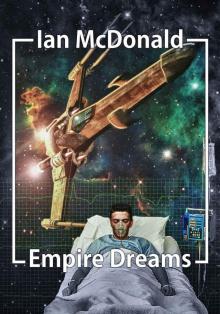 Empire Dreams
Empire Dreams The Menace from Farside
The Menace from Farside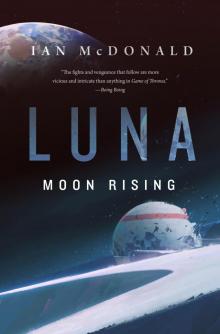 Luna: Moon Rising
Luna: Moon Rising Moon Rising
Moon Rising Desolation Road dru-1
Desolation Road dru-1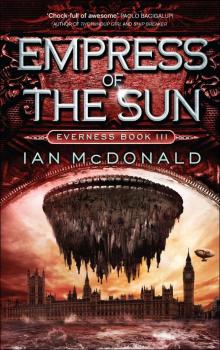 Empress of the Sun
Empress of the Sun Ares Express dru-2
Ares Express dru-2 Tendeléo’s Story
Tendeléo’s Story River Of Gods
River Of Gods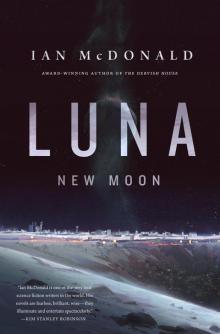 Luna
Luna![Cyberabad Days - [River of Gods 02] Read online](http://i1.bookreadfree.com/i1/03/29/cyberabad_days_-_river_of_gods_02_preview.jpg) Cyberabad Days - [River of Gods 02]
Cyberabad Days - [River of Gods 02]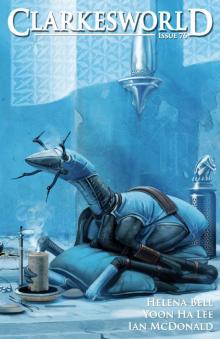 Clarkesworld Magazine Issue 76
Clarkesworld Magazine Issue 76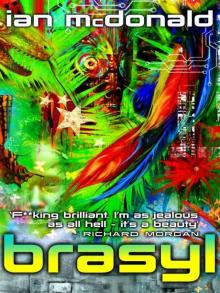 Brasyl (GollanczF.)
Brasyl (GollanczF.) Scissors Cut Paper Wrap Stone
Scissors Cut Paper Wrap Stone Chaga
Chaga Time Was
Time Was Cyberabad Days
Cyberabad Days Be My Enemy
Be My Enemy Changa
Changa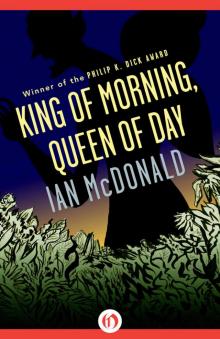 King of Morning, Queen of Day
King of Morning, Queen of Day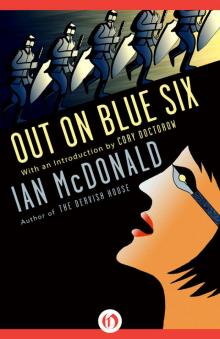 Out on Blue Six
Out on Blue Six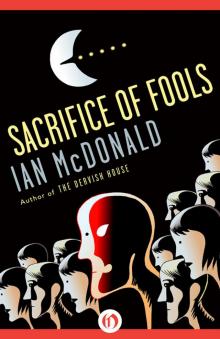 Sacrifice of Fools
Sacrifice of Fools Desolation Road
Desolation Road Luna--Wolf Moon--A Novel
Luna--Wolf Moon--A Novel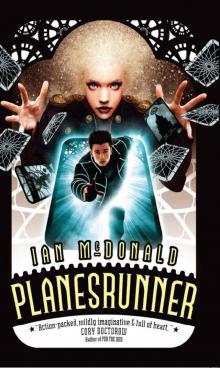 Planesrunner (Everness Book One)
Planesrunner (Everness Book One) Ares Express
Ares Express